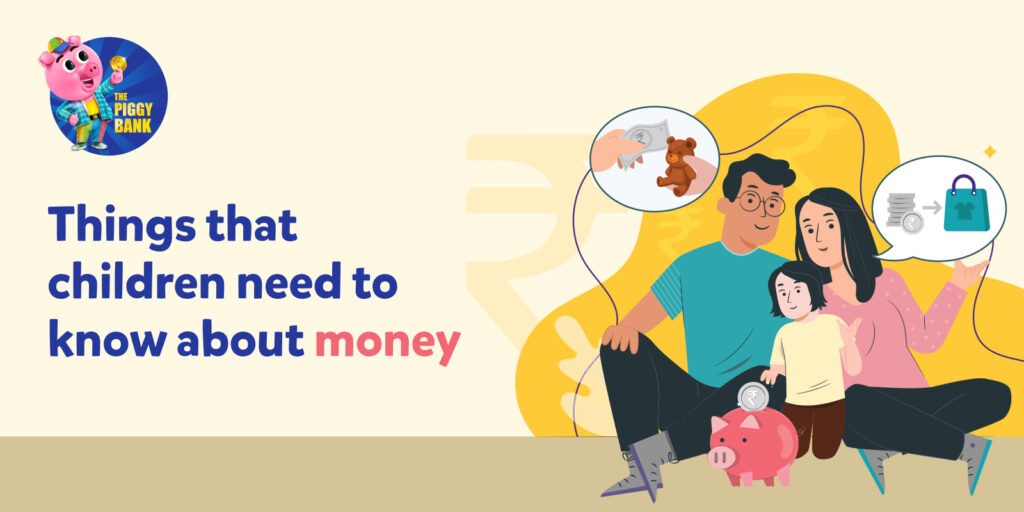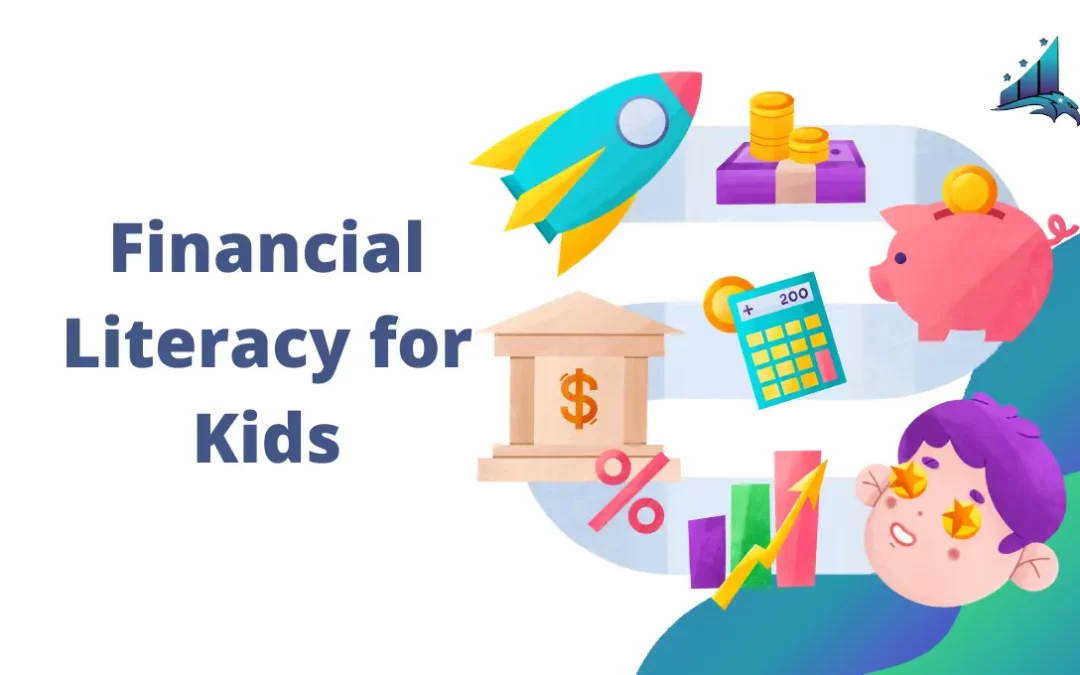Introduction – The Importance of Financial Literacy for Kids: Indian families eagerly discuss history, culture, and ethics with their children, but when it comes to money, they often feel their kids are too young. But let’s be real, your child doesn’t have to be a prodigy to learn basic financial literacy. In a world where Mozart gave his first concert at 7 and Abhimanyu learned the art of entering a Chakravyuha while in the womb, why limit our children’s potential by withholding financial knowledge? It’s time to empower our young ones with financial literacy!
What is Financial Literacy for children?
Financial literacy for children refers to the knowledge and skills that children need to understand basic financial concepts and develop good financial habits. This includes learning about the value of money, how to earn and save money, and how to spend money responsibly. Financial literacy for kids can be taught in a variety of ways, including through educational games and activities, conversations with parents and other adults, and structured lessons in school. It may include topics such as:
- Counting money and making change
- Budgeting and saving money
- Understanding the difference between wants and needs
- Learning about basic financial products like savings accounts and credit cards
- Understanding the concept of interest
- Recognizing scams and financial fraud
- Understanding the impact of advertising and marketing on spending habits.

Why should we teach financial Literacy for kids earlier?
Teaching financial literacy earlier can have several advantages for children and young adults, including:
- Building good financial habits: Learning about money management at a young age can help children develop good financial habits, such as budgeting, saving, and investing.
- Avoiding debt: By understanding the basics of personal finance, children and young adults can avoid common financial pitfalls, such as credit card debt and overspending.
- Making informed financial decisions: Financial literacy can help children and young adults make informed financial decisions, such as when to take out a loan, how to save for a major purchase, and how to invest for the future.
- Reducing financial stress: Having a solid understanding of personal finance can help reduce financial stress and anxiety for both children and adults.
On the other hand, not teaching financial literacy earlier can lead to several problems, including:
- Accumulating debt: Without a basic understanding of personal finance, children and young adults may be more likely to accumulate debt and struggle to manage their finances.
- Missing out on opportunities: Lack of financial knowledge can prevent young adults from taking advantage of opportunities, such as investing in the stock market or starting their own business.
- Financial insecurity: Poor financial decisions can lead to financial insecurity and instability, which can impact an individual’s overall well-being and quality of life.
- Limited financial options: Without a solid foundation in financial literacy, individuals may be limited in their financial options and may struggle to achieve their financial goals.

In summary, teaching financial literacy earlier can provide several advantages for children and young adults, while not teaching financial literacy earlier can lead to several problems that can impact an individual’s financial well-being and quality of life.
How Can You Start Teaching Your Children Financial Literacy?
Teaching your children financial literacy is an important part of helping them build a strong foundation for their financial future. Here are some tips to help you get started:
- Start Early: Start teaching your children about money as early as possible. Even young children can learn basic concepts such as counting, saving, and spending.
- Use Everyday Examples: Use everyday examples to teach financial literacy. For example, when you are grocery shopping, show your children how to compare prices and make a budget.
- Give Them an Allowance: Giving your children an allowance is a great way to teach them about money management. Help them set a budget for their allowance and encourage them to save a portion of it each week.
- Play Financial Games: Play games that teach financial literacy. Games such as Monopoly, The Game of Life, and Payday are great ways to help children learn about money management.
- Involve Them in Household Budgeting: Involve your children in household budgeting. This can help them understand the importance of living within their means and making smart financial decisions.
- Open a Bank Account: Help your children open a bank account. This can teach them about savings, interest, and banking fees.
- Teach Them About Debt: Teach your children about the dangers of debt and how to avoid it. Discuss the importance of credit scores, and explain how interest rates work.
- Be a Good Role Model: Finally, be a good role model for your children. Let them see you making smart financial decisions and living within your means. This will help them understand the importance of financial responsibility and the benefits of financial literacy.
Overall, teaching your children financial literacy takes time and effort, but it is a valuable investment in their future financial success. By starting early and using everyday examples, you can help your children build a strong foundation for their financial future.
Why financial literacy must be taught at schools?
Here are some reasons why financial literacy in schools matters today for the workforce of tomorrow:
- Personal Finance Skills are Essential for Success: In today’s complex and fast-paced world, personal finance skills are essential for success in life. Financial literacy empowers young people with the knowledge and skills they need to make sound financial decisions, manage debt, save for the future, and invest wisely.
- Financial Stress Can Impact Job Performance: Financial stress can have a significant impact on job performance. Employees who are struggling with financial problems may be distracted, anxious, and less productive at work. By teaching financial literacy in schools, we can help students avoid these problems and ensure they are prepared for financial challenges in the future.
- The Rise of the Gig Economy: With the rise of the gig economy and freelance work, more and more people are becoming self-employed or working as independent contractors. This means that they need to know how to manage their finances effectively, including budgeting, taxes, and retirement planning.
- Financial Scams and Fraud: Financial scams and fraud are on the rise, and young people are often targeted. By teaching financial literacy in schools, we can help students recognize these scams and protect themselves from financial fraud.
- A Financially Literate Workforce is Good for the Economy: A financially literate workforce is good for the economy. When individuals are financially savvy, they are more likely to make informed financial decisions, invest wisely, and contribute to the economy in a positive way.
Financial literacy is an essential skill that should be taught in schools. By providing students with the knowledge and skills they need to manage their finances effectively, we can prepare them for success in the workforce and in life.
Summary: Financial literacy is crucial for children to develop good financial habits, make informed financial decisions, and avoid debt and financial stress. Parents can start teaching their kids about money through fun and interactive activities, such as playing games, setting up a savings account, and involving them in household budgeting. By empowering our young ones with financial literacy, we can help them achieve financial security and success in the future.
